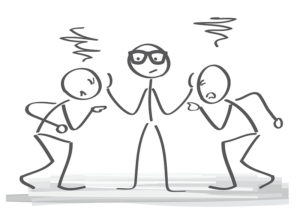Homeowners can choose the best HOA community for their needs and lifestyles, but they cannot choose their neighbors. Some homeowners may find themselves annoyed by the people living next door, and may even end up in conflict with them. Learn about bad neighbors, what to do legally here.
In this article:
Bad Neighbors: What to Do Legally
One of the best things about living in an HOA community is the tight, close bonds that homeowners have with each other. Having neighbors that you can trust and get along with adds to the level of security in your community. Thus, it can be a major disappointment when you move into your new home and discover that you have bad neighbors.
When you come across such neighbors, it’s easy to lock yourself in a room and start searching “how to get rid of bad neighbors legally.” If this situation seems all too familiar, then you’ve come to the right place.
Types of Bad Neighbors You May Encounter
Who are these bad neighbors in the first place? Here are different types of bad neighbors that you might meet.
1. The Noisy Neighbor
 The Noisy Neighbor encompasses a broad range of behaviors. It can be a neighbor with/who:
The Noisy Neighbor encompasses a broad range of behaviors. It can be a neighbor with/who:
- children who scream and throw tantrums all day long
- uncontrollable pet/s that make noise throughout the night
- throws parties ‘til the wee hours of the night
- plays loud instruments in their garage
2. The Annoying Neighbor
The Annoying Neighbor is someone who constantly involves him/herself in other community members’ businesses. They may patrol your neighborhood and try to police other homeowners who are not following the HOA rules — even though they have no official authority to do so.
The Annoying Neighbor can also be someone who constantly gossips. Every time you meet them, they will spill unsolicited details or stories about other people in your community. They may also act like a ‘know-it-all’ and always think that what they say is right. It’s almost as if they have a guide on how to annoy a neighbor in an HOA.
3. The Unaesthetic Neighbor
The Unaesthetic Neighbor doesn’t seem to care about the HOA rules and regulations regarding the physical appearance of their home. They might use unapproved exterior paint colors, have overflowing trash cans, overgrown landscaping, offensive signs on their property, and so on. They may also not care about shoveling shared pathways when needed or keeping their fences at the approved height.
4. The Criminal Neighbor
The Criminal Neighbor is someone that engages in illegal behavior in their home, and maybe even right in front of your eyes. They can also be a neighbor whose lifestyle or living conditions are considered health violations. Criminal Neighbors are much worse than your typical bad neighbor because they can cause significant harm to you and your community.
Bad Neighbors: What to Do Legally (for the HOA)
If you want to avoid HOA neighbor problems and other negative consequences, here’s how your HOA should deal with bad neighbors:
1. Follow Up Neighbor Complaints
As an HOA board member, you should always follow up on neighbor complaints. Try to do it as early as possible to prevent any escalation between the warring neighbors.
2. Send Notice Violation
If the bad neighbor has clearly broken the HOA’s rules and regulations, the HOA should send them an official notice violation. This informs them of their offense, which they might not even be aware of. The letter should include all the necessary details. It should also include fines if any, and what the neighbor should do to rectify the issue.
3. Mediate Between Neighbors
 The HOA can play a significant role in de-escalating conflicts between neighbors. Your mediation can help calm an angry neighbor and make the community peaceful once again.
The HOA can play a significant role in de-escalating conflicts between neighbors. Your mediation can help calm an angry neighbor and make the community peaceful once again.
If the HOA board member has personal relationships with one or both neighbors, it might be beneficial to have a third-party management company to mediate.
4. Take Necessary Action
If your previous efforts to deal with a bad neighbor does not work, the HOA can take further action. Make sure to check your CC&Rs, bylaws, and other governing documents on how to deal with bad neighbors.
For instance, the HOA may automatically evict a neighbor who is engaging in criminal activity or endangering the lives of your community members. If you are dealing with a violent neighbor, call the police immediately.
5. File a Lawsuit/Go to Small Claims Court
If you have bad neighbors what to do legally? In extreme cases, the HOA may choose to file a lawsuit or take the case to a small claims court. Legal matters can be very tricky to handle so HOA board members should consult their HOA manager or attorney on how to deal with bad neighbors.
Common Neighbor Disputes in HOAs
Here are some of the most frequent problems neighbors in HOA communities experience and how HOAs can handle them:
1. Noise
Noise usually takes the number one spot in any given homeowners association. This is because it’s easy to create noise, whether neighbors do it intentionally or unknowingly.
Homeowners associations must make sure it has noise policies in place to maintain peace in the neighborhood. It’s a good idea to impose quiet hours, as in hours when residents can’t make any noise. It can differ from community to community, but it usually falls between 11 p.m. and 8 a.m.
2. Pets
As much as they’re cute, furry friends can cause friction between neighbors. Pets can be noisy, messy, and even aggressive at times. To maintain everyone’s right to quiet enjoyment, it’s imperative for HOAs to enact pet policies.
These policies can include a number of restrictions, such as what types/breed of animals residents can keep as pets and how many pets they can own. Pet owners should also keep their pets under control at all times and pick up after them. In some cases, HOAs can force the removal of pets if they continue to be a nuisance in the neighborhood. Other HOAs are stricter, banning pets altogether.
3. Children
Children are little bundles of joy, sure, but they can also be a source of irritation for neighbors. Their loud or unruly behavior are some of the most common complaints, but they can also inadvertently cause damage to property.
State laws typically place the responsibility on children’s parents to keep them under control. On the HOA’s part, it’s important to treat children equally. That means you shouldn’t create rules specifically for children because that would be in violation of most Fair Housing laws. Instead, treat them as you would treat the adult residents of the community.
4. Aesthetics
Another common issue between neighbors has to do with the physical appearance of their homes. This can be anything from overflowing trash cans or a badly-maintained yard to offensive signs and over-the-top holiday decorations.
As with noise and pets, HOAs should have policies that regulate these types of things. If a resident fails to adhere to the policy, neighbors can report it to the HOA. Once the HOA deems the complaint valid, it should follow standard procedures. For most associations, that means starting with a violation notice to the neighbor asking them to correct the situation.
5. Property Boundaries
Many neighbors have disputes over property lines — as in where one resident’s property starts and ends. This type of issue can quickly escalate, even leading to legal disputes between neighbors. To prevent lawsuits, HOAs should encourage homeowners to have their property surveyed before making any changes or additions. This way, homeowners can act within their rights and avoid the many hassles associated with court proceedings.
6. Parking
Residents can also complain about the neighbor parking in front of their house or blocking their driveway. When this happens, the HOA should carefully inspect the matter and refer to its governing documents for the proper guidelines. Many associations have rules about parking, including where homeowners can park and when. If a violation has indeed occurred, the HOA should take action.
7. Smoking
A lot of associations have no-smoking policies when it comes to common areas, but what about residents smoking from patios and balconies? Neighbors can complain about the smoke wafting into their homes. In many ways, smoking can be considered a nuisance, but dealing with this complaint can be tricky for HOAs.
First of all, the HOA should consider whether or not to address the complaint. If only one neighbor complains about the smoke, then the two neighbors can settle it among themselves. The HOA might get involved, but only to the extent that it asks the offending party to adopt solutions that minimize the impact of smoke on their neighbor.
Bad Neighbors: What to Do Legally (for Homeowners)
 As a homeowner, what can you do about bad neighbors? Remember that communication is key. You can avoid all the potential drama by simply making an effort to understand your neighbor’s perspective.
As a homeowner, what can you do about bad neighbors? Remember that communication is key. You can avoid all the potential drama by simply making an effort to understand your neighbor’s perspective.
For instance, do they live a busy life? Do they have kids? Are they single or divorced? All of these personal situations can contribute to reckless behavior.
Get to know your neighbor. Once you have learned a little about them, take some steps to establish your roles as acquaintances instead of strangers. If this doesn’t work, then you can always ask for help or mediation from your HOA board or management.
What to Do About Neighbor Harassment
Sometimes, though, disputes can escalate to the point where it becomes a form of harassment. A resident can begin to deliberately harass their neighbors. It’s one thing to know how to deal with rude neighbors, but harassment is a totally different ball game.
What constitutes harassment by a neighbor? Harassment is an action that someone does intentionally and repeatedly. This includes a display of consistently bad behavior, making derogatory or threatening comments, and any other act designed to purposefully annoy or intimidate.
Here’s what to do if you feel threatened by a neighbor:
- Document the harassment. It’s a good idea to have proof that the harassment is taking place. To learn how to document neighbor harassment, take notes. Write down what sort of behavior your neighbor displays and when. You can also take photos or videos as well as turn to witnesses for support.
- Report the issue to the HOA. Can you complain to HOA about neighbor harassment? Yes. When the HOA receives a harassment report, it should take it seriously. Failure to do so can land your association in legal trouble. The HOA should seek legal counsel and refer the issue to local authorities.
- Call the police. You can go straight to law enforcement in case of threats or harmful behavior from neighbors. It doesn’t have to be limited to the HOA. Harassing neighbors homeowners association is a cause for police intervention.
- Take legal action. Get the law involved by suing your neighbor for harassment and aiming for a restraining order. To support your cause, of course, you will need to collect evidence in the form of police reports, witnesses, and videos.
Dealing with Bad Neighbors: What to Do Legally
It can be stressful to deal with bad neighbors — both for homeowners and the board. But, the key here is to deal with the situation as fairly and level-headed as possible. It’s understandable that tempers will flare, but such escalations will only mean more trouble for your community. As an HOA board member, look to your governing documents and/or HOA management company to find ways on how to deal with bad neighbors, what to do legally, etc.






